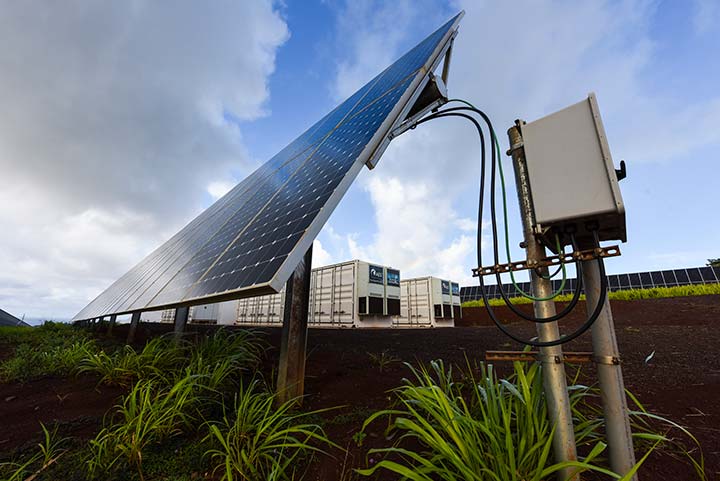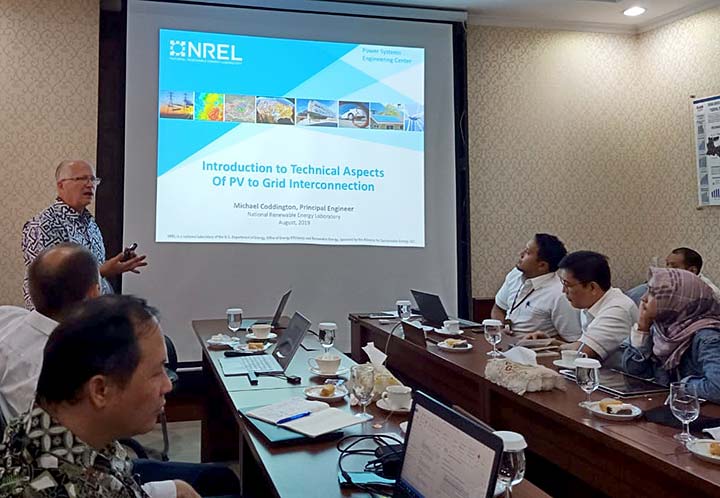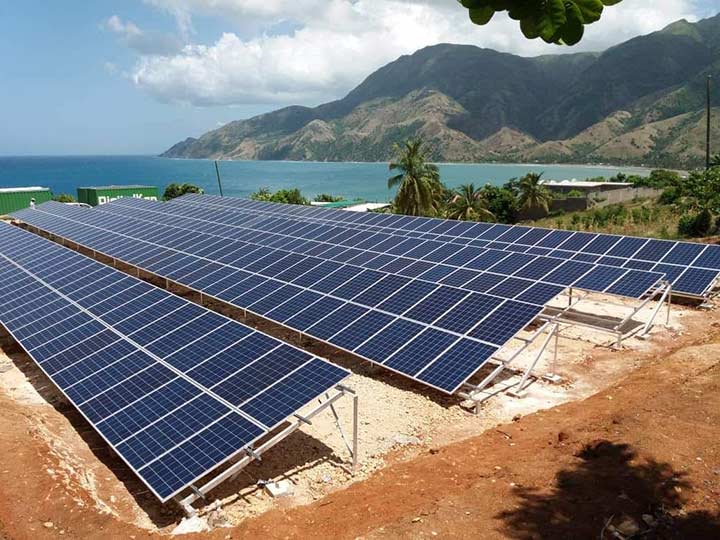USAID-NREL Partnership Newsletter – Fall 2019
Read our Fall 2019 issue for updates on our country activities, events, global technical platforms, and resources.
Featured News
Research Exchange at NREL's Campus Accelerates the Philippines' Clean Energy Transition
The USAID-NREL Partnership hosted a modeling group from the Philippines at NREL's campus for a month-long research exchange supporting the Philippines' development of competitive renewable energy zones. By working directly with NREL's power sector experts, the group refined key models used to enable proactive transmission planning for scaling up renewable energy in the Philippines. Learn more about the results of the exchange by reading the NREL news article or by watching the video.
For more resources on the renewable energy zones transmission planning process, see the Greening the Grid: Renewable Energy Zones Toolkit.
Q&A with Sherry Stout: Building Capacity and Collaboration for Energy Resilience

Sherry Stout is an engineer in NREL's Integrated Decision Support group who specializes in addressing energy challenges in rural, remote, and developing communities. As a representative of the USAID-NREL Partnership, Sherry contributes to energy resilience projects in countries and regions such as Colombia, Laos, and the Caribbean.
To learn more about her work in the resilience field and the importance of coordinated, diverse stakeholdergroups in energy planning, read the Q&A with Sherry Stout.
What's New in Global Technical Platforms
Renewable Energy Explorer

Renewable Energy (RE) Explorer provides renewable energy data, geospatial analysis tools, and technical assistance to support data-driven renewable energy decision making.
Learn more by visiting the RE Explorer website.
Propelling Private Sector Investment and Innovation

The RE Data Explorer tool and the RE Explorer platform are helping build international markets and enable renewable energy investment opportunities. U.S.-based companies are leveraging the tool and its underlying data to drive innovation forward, such as using RE Data Explorer to model irradiance variation for the design of insurance products, to support the design of solar-powered Wi-Fi products, and to enable deployment of residential photovoltaic systems. Other key renewable energy markets for private sector stakeholders include India, Southeast Asia, Pakistan, and Bangladesh.
To learn more about how the private sector can use the RE Data Explorer to support project development and investment decisions, watch the RE Data Explorer Tool: Private Sector Applications webinar on the Clean Energy Solutions Center website.
Renewable Energy Data Explorer Technical Potential Tool Available for Web Integration
The Technical Potential Tool on the RE Explorer platform allows users to interactively analyze the technical potential for renewable energy development in an area, enabling solar- and wind-based generation in various countries. Users of the RE Data Explorer Technical Potential Tool can now implement the tool within another web tool or interface using a new application programming interface (API). This allows convenient access to the technical potential parameters, data layers, and exclusions on RE Data Explorer.
To find out more about the API, see the RE Explorer Technical Potential Tool .
Interactive Southeast Asia Levelized Cost of Energy Report Now Available
A report exploring renewable energy opportunities in select Southeast Asian countries using the levelized cost of energy mapping tool from RE Data Explorer is now available in an interactive, web-friendly format on the RE Explorer site. The report is organized into distinct sections, allowing users to more easily navigate different topic areas and better digest key findings.
On the RE Explorer website, see Exploring Renewable Energy Opportunities in Select Southeast Asian Countries
Greening the Grid

Greening the Grid is a platform for expertly curated information, tools, and technical assistance to support countries in power system transformation and grid modernization. Greening the Grid addresses technical challenges around grid modernization and advanced energy integration through the Grid Integration toolkit, the Renewable Energy Zones toolkit, and the Distributed Photovoltaics toolkit.
Learn more by visiting the Greening the Grid website.
Grid Integration Toolkit
Understanding Battery Energy Storage Systems and Their Role in Grid Integration

Photo by Dennis Schroeder, NREL.
The role of grid-scale battery energy storage systems has gained prominence because of the increasing need for power system flexibility coupled with the rapid decline in the cost of storage technologies, particularly lithium-ion batteries. More utilities and governments are now seeking to determine whether battery storage is a cost-effective option for enabling power systems to integrate large shares of variable renewable energy.
By providing a comprehensive suite of resources to address the topic's complexities, the Grid Integration Toolkit seeks to answer common questions and dispel misconceptions around grid-scale battery energy storage systems.
To learn more, see Understanding Battery Energy Storage Systems and Their Role in Grid Integration and Grid-Scale Battery Storage: Frequently Asked Questions.
For more resources, see the Greening the Grid: Grid Integration Toolkit.
Distributed Photovoltaic Toolkit
Using Distributed Photovoltaic Impact Analysis To Support Clean Energy Transitions

NREL engineer Michael Coddington hosts a discussion about DPV analysis in Indonesia. Photo by Tim Reber, NREL.
The USAID-NREL Partnership is working in Ghana and Indonesia to assist with power sector planning and developing low-emission, least cost pathways to sustainable and reliable power sectors.
In Ghana, representatives from the USAID-NREL Partnership hosted trainings for utility distribution engineers on the tools and study methods used in evaluating distributed photovoltaic (DPV) impacts to the grid. These efforts are part of a multiyear workplan to support clean energy integration and investment in the country.
Representatives from the USAID-NREL Partnership also engaged utility partners and government stakeholders in Indonesia to address the barriers to distributed generation deployment. The workshops covered both technical issues and revenue impacts of distributed generation to customers and utilities. The broader job and economic impacts of distributed generation were also evaluated using the I-JEDI analysis model.
For more information on DPV technologies, visit the DPV toolkit analysis web page.
Resilient Energy Platform

The Resilient Energy Platform provides expertly curated resources, training materials, tools, and direct technical assistance in planning resilient, sustainable, and secure power systems. The platform enables decision makers to assess power sector vulnerabilities, identify resilience solutions, and make informed decisions to enhance power sector resilience at all scales.
Learn more by visiting the Resilient Energy Platform website.
Examining Power System Threats and Their Relationship to Energy Security

Two new fact sheets, titled Understanding Power System Threats and Impacts and Renewable Energy to Support Energy Security, define potential threats to the power sector and the impacts they may cause to communities and power system operations. The fact sheets also explore how renewable energy generation can support energy security and resilience.
To learn more about power system resilience, see the Resilient Energy Platform Fact Sheet series.
Country Support
Country Support
In addition to the technical platforms, the USAID-NREL Partnership addresses country-specific challenges through targeted, fully customized technical assistance. These activities, often based on the technical platforms, address technical energy sector challenges that may include planning, policy formulation, and market barriers.
Deploying Minigrids for Sustainable Economic Growth in Haiti

A minigrid in Tiburon, Haiti. Photo by Ryan Shelby, USAID.
The USAID-NREL Partnership and the World Bank collaborated with the Government of Haiti to develop a request for proposals for the development of minigrids in Haiti by providing trainings and technical assistance to enable private sector partnerships and enhance scaling up advanced energy technologies. The interactive trainings, hosted by the USAID-NREL Partnership, focused on minigrid construction and operation for both private developers and government stakeholders.
To find out more, see Deploying Minigrids for Sustainable Economic Growth in Haiti.
Exploring the Concept of Gate Closure in Power Market Design in India
A new report, titled Opening Markets, Designing Windows, and Closing Gates: India's Power System Transition—Insights on Gate Closure, explores the concept of gate closure—the time at which market participants must submit their final bids and offers for electricity. Gate closure is typically considered a minor feature of market design, but its implementation could be pivotal to the way that power markets will operate under high penetrations of renewable energy.
The report analyzes global experiences with gate closure, and reviews the unique benefits, challenges, and other considerations that will impact the implementation of gate closure in the Indian electricity market. The report was produced by NREL with the support of USAID and the Government of India Ministry of Power.
To learn more, see Greening the Grid: India.
Recent Events
August 22, 2019, Webinar: Resilient Energy Platform and Power Sector Resilience Planning
in the Lao PDR
Sherry Stout, a leading power sector resilience expert from NREL, provides an overview
of the Resilient Energy Platform as well as its supplemental Power Sector Resilience Planning Guidebook. Together with Yevang Nhiavue, of the Lao People's Democratic Republic Ministry of
Energy and Mines, they also review the real-world example of how these resources informed
the resilience action plan in the Lao People's Democratic Republic. Watch the webinar on the Resilient Energy Platform website.
October 21, 2019, Webinar: Distributed Photovoltaic Economic Impact Analysis in the
Philippines
This webinar summarizes a comprehensive study evaluating the economic and technical
implications of distributed photovoltaic deployment in the Philippines. The study,
titled Distributed Photovoltaic Economic and Technical Impact Analysis in the Philippines, provides data-driven analysis on utility revenue, retail rates, and grid capacity
limits, and examines their impact on potential policy and regulatory revisions. Watch the webinar on the Clean Energy Solution's Center website.
Must Reads
Installed Capacity Caps for Distributed Photovoltaics and Their Impacts on Compensation Mechanisms
Resilient Energy Platform: Planning Resilient, Sustainable, and Secure Power Systems
Technical Potential of Solar in Peru using the Renewable Energy Data Explorer
Subscribe to our Newsletter
To stay up to date with the latest news, updates, and events from the USAID-NREL Partnership, subscribe to our quarterly newsletter.
SubscribeShare
